COGMAR - Ubiquitous cognitive computer vision for marine services
COGMAR - Ubiquitous cognitive computer vision for marine services
Project news
New paper by project partners NR, Institute of Marine Research and UiT:
Explaining decision of deep neural networks used for fish age prediction.
Alba Ordoñes, Line Eikvil, Arnt-Børre Salberg, Alf Harbitz, Sean Meling Murray, and Michael C. Kampffmeyer.
PLoS ONE 15(6), 2020
Project summary
Deep learning has been called the revolutionary technique that quietly
changed machine vision forever, but is at present mainly applicable to standard RGB images of natural scenes or objects, or otherwise only for other types of imagery when a substantial amount of labelled data is available, which is seldom the case.
This project aims at enabling this technology for computer vision problems anywhere, by developing easy-to-use cognitive solutions also for non-standard images and thereby extending the use of autonomous cognitive computer vision systems to new application areas. The methodology will be general and transferable to other domains such as medical imagery, remote sensing and various industrial applications. Within the project the aim is to solve key big data computer vision challenges in the marine sector.
The overall concept of the project is to exploit the power of deep convolutional neural networks (CNNs) by developing new solutions for learning necessary to classify, localize and segment objects in non-standard, sparsely labelled, image data. Motivated by the methods' ability to generalize and the fact that unlabelled data is often inexpensive to acquire, our approach for solving this will be based on three main concepts; (i) cross-domain transfer learning, (ii) semi-supervised learning and (iii) data augmentation and simulation.
Fisheries and aquaculture are major industries in Norway, and marine image data are acquired in a wide range of formats and modalities for various tasks. Automatic solutions for extracting information from these big non-standard image data will bring exploitation of these data in the marine science to a new level, enabling extraction of new knowledge and continuous monitoring of marine ecosystems. Solutions from the project will also contribute to innovation for industries manufacturing solutions for automated monitoring of fish and marine environments.

Project period
Financing
Reseach Council of Norway
Project no. 270966
Partners
Institute of Marine Research
UiT - The Arctic University of Norway
Scantrol DeepVision AS
KTH Royal Institute of Technology



 Hvordan komme til NR
Hvordan komme til NR Del på sosiale media
Del på sosiale media Personvernerklæring
Personvernerklæring